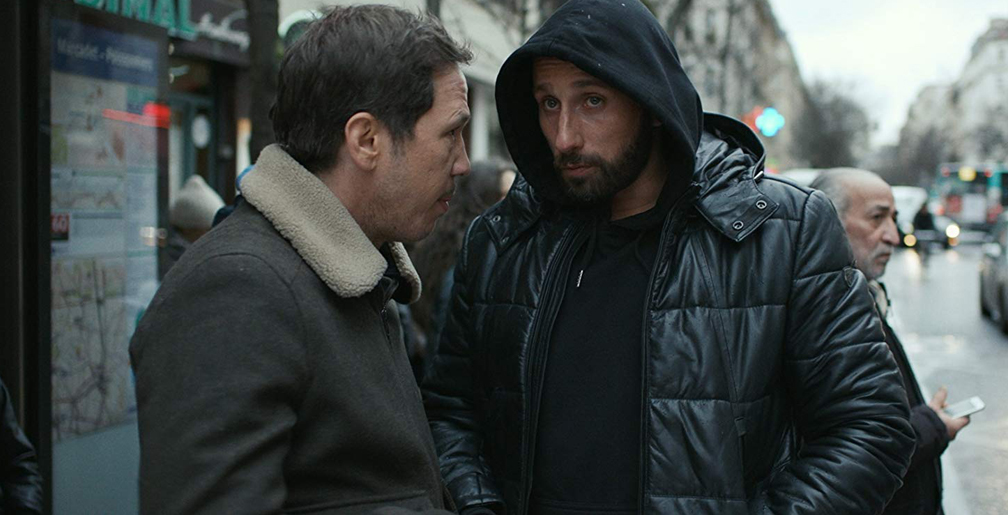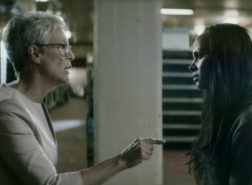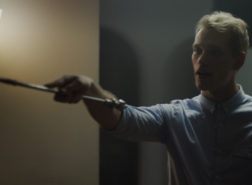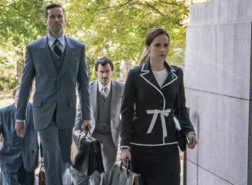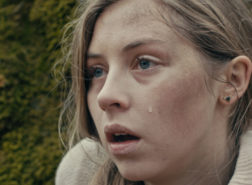Driss and Manuel are two childhood friends who end up taking opposite paths: Manuel chose to embrace the thug life, while Driss becomes a cop. When Manuel’s biggest deal goes terribly wrong, the two men meet again and come to realize they both need each other to survive in their worlds.
Two men from the same neighborhood. One becomes a cop and joins the narcotics department while the other stays close to home, cutting cocaine and making drug deals. Driss (Reda Kateb) knows the neighborhood and the dealings better than most cops because he used to live there. He knows the people who live there. He grew up with them. Strategically, he tags one of the drug runners, Imrane (Adel Bencherif), and leans on him to set up a bust in order to bring down the Reyes gang. Meanwhile, Manuel (Matthias Schoenaerts) and Imrane welcome Nouri (Omar Salim) home from prison before they all gather at Raji’s (Ahmed Benaissa) house for a reunion.
Raji is the leader of the “family,” primarily dealing in hash, but he stays under the radar, remaining untouchable by the narcotics department for the cocaine that he also directs. The big handoff to the Reyes gang is scheduled with Imrane and Manuel in charge. Everything seems like it is going according to plan until suddenly there are gunshots and mayhem as they are ambushed during transportation. Only Manuel manages to escape. What follows next is a very tangled game of cat-and-mouse and it’s very difficult to always know who is the cat and who is the mouse.
The plot itself is pretty typical for this genre. However, the social dynamics at play between Driss and Manuel with their respective loyalties are the true conflict of the story. Driss is embarrassed that his sting operation has gone bust with the death of his informant. Still, he takes it on himself to notify Imrane’s wife, feeling that she should hear it from someone she knows. When she first sees him, she sees him as the long-ago friend of their social circle, but as the silence and confusion steady, she notices the police band on his arm and realizes that he is not calling as a friend and it is her worst fear. Scenes like these are deafening, more so than the gunshots or angry voices of men trying to determine who is the traitor.
![]()
I had the opportunity to speak with the writer and director of the film, David Oelhoffen, about various elements in the movie.
Jeanne Antoinette: Your film was initially titled as “Territories,” which you co-wrote with Jeanne Aptekman. Did “Territories” originally refer only to the political dichotomy between cop and criminal, both from the same neighborhood? Or did it refer to a larger concept of France and Morocco and Portugal with regards to the drug trafficking?
David Oelhoffen: It was originally called “Territories” because it was meant to encompass all of those territories within the plot. The drug territories, the law enforcement territories, but more importantly, the social territories as the main character, Driss (Reda Kateb), is trying very hard to change the territory where he grew up and where he wants to build his life.
However, we eventually decided that the title “Territories” was too abstract. We settled on what we believed was a simpler title that allowed for a political dimension but also created space for the social dimension.
Jeanne Antoinette: This is not your first successful film starring Reda Kateb. Matthias Schoenaerts is also a good choice, particularly if you are looking for more international exposure. How would you describe the influences for your writing or directing preferences?
David Oelhoffen: When we began writing the character of Driss, we were writing it with Kateb in mind. His personal career has been very diverse and I view him as someone who shares many similarities with Driss. He has experienced the tension of social labels and the struggle to be recognized as someone who is more than just a label.
As for Schoenaerts, of course, he is a great addition because he comes with credentials that appeal to a broader audience. However, he also has a wonderful physical charisma and he is not afraid to be sensitive. His character, Manuel, is completely adapted to the violent life and yet he is very rooted in his identity as a member of Raji’s family. Manuel is a man, but also really just a child looking for his dad. And Schoenaerts expresses the emotional depth of the character as thoroughly as he embodies the aggressive masculinity needed to assert himself into Manuel’s life choices.
Jeanne Antoinette: As a linguist, I am curious about the process of translating a script into subtitles. How much oversight do you have with the writing of the subtitles? How do you make sure that your story isn’t lost in translation for international audiences?
David Oelhoffen: Yes, of course, it is a concern for us that the subtitles will be translated accurately for international audiences. At the same time, we tend to use British English phrases and words even when translating for American viewers. For example, we use the word “fuzz” to refer to the police rather than the slang that Americans might be more familiar with in that context. But my own grasp of English is not the best. So I have to rely on others to be assured that the film is translated correctly. I certainly hope that the translation does not keep our story from being heard the way we are intending to tell it.
Jeanne Antoinette: The conflict of “Close Enemies” is that of two friends who grew up in the same suburb but took opposite paths in life choices. Your next two film projects also present a presumably opposite stance on war, one the activist soldier (“Les derniers hommes”), the other the pacifist zealot (“The Fourth Wall”). What do you think about the psychology of cop and the criminal? The soldier and the peace-monger? Are they really opposites? Is this a motif that you are drawn to exploring?
David Oelhoffen: That is a great question. Absolutely, they are two faces of the same coin. And yes, I am curious to explore the tension between social and political environments, but not only conceptually. I particularly like to depict the social tension, how it works inside of a family, inside of a man, even in an intimate way.
And I believe it is this motif of tension and entanglement with our many selves that makes this film a great story. Oelhoffen has crafted a notable work in coordinating a thought-provoking story through the capabilities of Kateb and Schoenaerts, along with the raw movements of DP Guillaume Deffontaines’ cinematography, and a subtle, but magnetic score done by Superpoze. David Oelhoffen is definitely establishing himself in the entertainment industry, both in France and internationally.
“Close Enemies” just had its U.S. Premiere at Fantastic Fest



